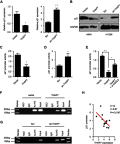THAP7 promotes cell proliferation by regulating the G1/S phase transition via epigenetically silencing p21 in lung adenocarcinoma
- PMID: 31372002
- PMCID: PMC6634299
- DOI: 10.2147/OTT.S208908
THAP7 promotes cell proliferation by regulating the G1/S phase transition via epigenetically silencing p21 in lung adenocarcinoma
Abstract
Purpose: Lung adenocarcinoma (LUAD) is one of the most common cancers worldwide. The THanatos-Associated Proteins (THAP) family plays an essential role in multiple cancers. However, the role of THAP7 in cancers has remained elusive.
Methods: THAP7 expression status in LUAD tissues was analysed by using the Oncomine database and qRT-PCR, and its expression level in LUAD cell lines was detected by qRT-PCR and Western blotting. The role of THAP7 in LUAD cells was determined by proliferation, colony formation, and cell cycle analyses. In vivo role of THAP7 was studied on xenograft models. Luciferase reporter assays and chromatin immunoprecipitation (ChIP) were used to determine the activity and acetylation of the p21 promoter.
Results: THAP7 expression was increased in LUAD tissues and cell lines. Moreover, the high expression of THAP7 was correlated with poor prognosis. The overexpression of THAP7 accelerated the G1/S phase transition and promoted tumour growth both in vitro and in vivo. A mechanistic study revealed that THAP7 reduced the acetylation of histone H3 on the p21 promoter to suppress p21 transcription.
Conclusion: For the first time, we demonstrated the function of THAP7 in LUAD, and our findings suggested that THAP7 may be a potential molecular therapy target in LUAD.
Keywords: THAP7; cell cycle; lung adenocarcinoma; p21; proliferation.
Conflict of interest statement
The authors report no conflicts of interest in this work.
Figures




Similar articles
-
Thanatos-associated protein 7 associates with template activating factor-Ibeta and inhibits histone acetylation to repress transcription.Mol Endocrinol. 2006 Feb;20(2):335-47. doi: 10.1210/me.2005-0248. Epub 2005 Sep 29. Mol Endocrinol. 2006. PMID: 16195249
-
LncRNA LINC00525 suppresses p21 expression via mRNA decay and triplex-mediated changes in chromatin structure in lung adenocarcinoma.Cancer Commun (Lond). 2021 Jul;41(7):596-614. doi: 10.1002/cac2.12181. Epub 2021 Jun 9. Cancer Commun (Lond). 2021. PMID: 34105888 Free PMC article.
-
DMBX1 promotes tumor proliferation and regulates cell cycle progression via repressing OTX2-mediated transcription of p21 in lung adenocarcinoma cell.Cancer Lett. 2019 Jul 1;453:45-56. doi: 10.1016/j.canlet.2019.03.045. Epub 2019 Mar 27. Cancer Lett. 2019. PMID: 30928384
-
Human THAP7 is a chromatin-associated, histone tail-binding protein that represses transcription via recruitment of HDAC3 and nuclear hormone receptor corepressor.J Biol Chem. 2005 Feb 25;280(8):7346-58. doi: 10.1074/jbc.M411675200. Epub 2004 Nov 23. J Biol Chem. 2005. PMID: 15561719
-
Junctional adhesion molecule-like protein promotes tumor progression via the Wnt/β-catenin signaling pathway in lung adenocarcinoma.J Transl Med. 2022 Jun 7;20(1):260. doi: 10.1186/s12967-022-03457-w. J Transl Med. 2022. PMID: 35672776 Free PMC article.
Cited by
-
Single-cell genome and transcriptome sequencing without upfront whole-genome amplification reveals cell state plasticity of melanoma subclones.Nucleic Acids Res. 2025 Mar 20;53(6):gkaf173. doi: 10.1093/nar/gkaf173. Nucleic Acids Res. 2025. PMID: 40138718 Free PMC article.
-
Silencing LMNB1 Contributes to the Suppression of Lung Adenocarcinoma Development.Cancer Manag Res. 2021 Mar 18;13:2633-2642. doi: 10.2147/CMAR.S275874. eCollection 2021. Cancer Manag Res. 2021. PMID: 33776481 Free PMC article.
-
Construction and experimental validation of an acetylation-related gene signature to evaluate the recurrence and immunotherapeutic response in early-stage lung adenocarcinoma.BMC Med Genomics. 2022 Dec 11;15(1):254. doi: 10.1186/s12920-022-01413-7. BMC Med Genomics. 2022. PMID: 36503492 Free PMC article.
-
Mutation of the Thap4 gene causes dwarfism and testicular anomalies in rats and mice.Mamm Genome. 2024 Jun;35(2):149-159. doi: 10.1007/s00335-024-10041-8. Epub 2024 Apr 24. Mamm Genome. 2024. PMID: 38658415
References
LinkOut - more resources
Full Text Sources

